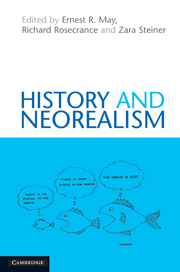Book contents
- Frontmatter
- Contents
- List of tables
- Notes on contributors
- Acknowledgments
- 1 Theory and international history
- 2 Transformations in power
- 3 Domestically driven deviations: internal regimes, leaders, and realism's power line
- 4 How international institutions affect outcomes
- 5 Not even for the seventeenth and eighteenth centuries: power and order in the early modern era
- 6 Austria-Hungary and the coming of the First World War
- 7 British decisions for peace and war 1938–1939: the rise and fall of realism
- 8 Realism and risk in 1938: German foreign policy and the Munich Crisis
- 9 Domestic politics, interservice impasse, and Japan's decisions for war
- 10 Military audacity: Mao Zedong, Liu Shaoqi, and China's adventure in Korea
- 11 The United States' underuse of military power
- 12 The overuse of American power
- 13 Redrawing the Soviet power line: Gorbachev and the end of the Cold War
- 14 Shared sovereignty in the European Union: Germany's economic governance
- 15 John Mearsheimer's “elementary geometry of power”: Euclidean moment or an intellectual blind alley?
- 16 History and neorealism reconsidered
- Index
- References
16 - History and neorealism reconsidered
Published online by Cambridge University Press: 05 June 2012
- Frontmatter
- Contents
- List of tables
- Notes on contributors
- Acknowledgments
- 1 Theory and international history
- 2 Transformations in power
- 3 Domestically driven deviations: internal regimes, leaders, and realism's power line
- 4 How international institutions affect outcomes
- 5 Not even for the seventeenth and eighteenth centuries: power and order in the early modern era
- 6 Austria-Hungary and the coming of the First World War
- 7 British decisions for peace and war 1938–1939: the rise and fall of realism
- 8 Realism and risk in 1938: German foreign policy and the Munich Crisis
- 9 Domestic politics, interservice impasse, and Japan's decisions for war
- 10 Military audacity: Mao Zedong, Liu Shaoqi, and China's adventure in Korea
- 11 The United States' underuse of military power
- 12 The overuse of American power
- 13 Redrawing the Soviet power line: Gorbachev and the end of the Cold War
- 14 Shared sovereignty in the European Union: Germany's economic governance
- 15 John Mearsheimer's “elementary geometry of power”: Euclidean moment or an intellectual blind alley?
- 16 History and neorealism reconsidered
- Index
- References
Summary
No scholar, historian, or policy-maker wishes to dispute the role that power plays in foreign affairs. From Thucydides to modern international politics, the power of a state has influenced its position and success in dealing with other countries. But the calculus of “power” is not the be-all and end-all of national policy in international relations. Countries are prompted to act as a result of their economic circumstances, their moral codes, and their institutional setting (reinforced by domestic politics) as much as by their position in the power hierarchy. Leaders frequently have ambitions that range beyond the limits that power technically permits. Sometimes, decision-makers also minimize their involvements owing to the pressures of internal factors. Sustained by such pressures, international institutions, ideologies, and recognized legitimacies temper and channel the pursuit of influence. Sometimes leaders strive to protect their own position against domestic opponents, even when their country might lose a war in consequence. The definition of the state's situation in foreign affairs also conditions outcomes: is the state rising or declining? Does action have to be taken to prevent further decline? In regard to each of these factors, the authors of this volume have shown in case after case that countries do not restrict their policies to what their “power line” apparently mandates – the relative position they occupy vis-à-vis other major nations in the power hierarchy. Instead they chart their own course – influenced by external pressures, but not determined by them.
- Type
- Chapter
- Information
- History and Neorealism , pp. 341 - 365Publisher: Cambridge University PressPrint publication year: 2010
References
- 1
- Cited by



